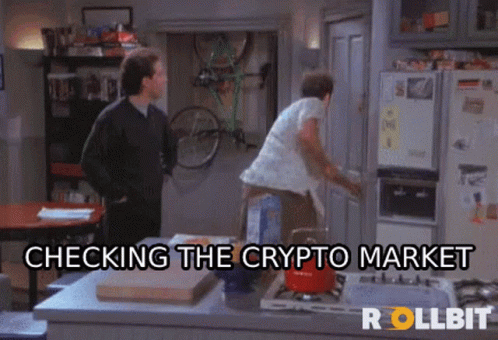Issue 13: Is onchain publishing a new new media model?
This issue of the newsletter is all about onchain publishing. The crux is whether or not onchain publishing will create new kinds of media models.

The crypto market broke the sideways chop we talked about last week and fell to the downside.
Bitcoin is down 8% on the seven-day chart, Ethereum is down 11%, and Solana dropped 24% as I write this.
Several factors continue to affect the market. The sample platter of reasons include confused global macroeconomics and buyers taking a breather after the recent run-up to new all-time highs across the market. The growing turbulence in terms of geopolitical tensions and escalating conflicts doesn’t help matters.
There are also some internal dynamics to consider. The Bitcoin halving will likely happen this coming Saturday. The market has traditionally dipped pre-halving as miners take profits or reorganize before the supply cut (more on this next week).
For regular market watchers, after a week of red, it’s hard to remember that the market's all-time highs were not that long ago.

Also this week, the Securities and Exchange Commission (SEC) issued a Wells notice against the decentralized finance exchange, Uniswap Labs.
The SEC issues a Wells notice before announcing enforcement actions or opening an investigation. The Wells notice alleges that the Uniswap Protocol, which acts like a decentralized automated market maker, is running afoul of US securities law.
There are several ongoing skirmishes between the SEC and the crypto industry (we touched on the court case between Coinbase and the SEC recently). Short term these cases will be a distraction and likely create extra headwinds for the market.
But it's the long-term trend that is more concerning. Crypto and decentralized finance are new technologies. They are complicated because they combine software and internet networks with finance and money. If regulators here, or anywhere, keep trying to compare them to traditional investments and equities, then crypto and its related activities will continue to not make sense within the context of existing frameworks.
We can all learn lessons from the early days of the internet — and understand how it is that the United States became a hotspot for innovation and eventually the headquarters to massive tech platforms and internet startups alike. It was largely because the early internet was left alone to grow and old laws regarding telecomm or interstate commerce weren’t applied to the way that people were building and creating new value on a new network.
There’s much more to say about this, but for now, let’s hear from the builders at Uniswap. Here’s an excerpt from what they said in a post about the Wells notice this week, and which pretty much sums up the situation:
"If the SEC protects opaque systems and attacks new, transparent technology that can open up opportunity and reduce costs for Americans, the U.S. will fall behind on innovation that can power consumer choice and freedom. We’re disappointed that we may have to fight a U.S. government agency to protect innovation and economic freedom."
If you have a minute, it’s worth reading Uniswap’s full response here.
Moving words onchain
Switching gears, the theme this week was all about moving words onchain. The first post of the week was about the emergence and growing popularity of onchain publishing platforms like Mirror and Paragraph.
March Madness onchain
Tracking fitness onchain
Minting NFTs onchain
In terms of overall user experience for the reader and the writer, publishing onchain doesn’t change a whole lot. On the surface, the user interface for reading and writing is the same as what you find on popular web2 apps.
Paths start to diverge on the backend. Writers can set up an onchain publication that is connected to a web3 wallet, which makes it more integrated with distribution and monetization options as well as provides a more secure experience for all parties involved.

Get more context and details about onchain publishing.
Where things start to feel like a new frontier are the options for creating value from a post. With onchain publications, writers can give readers the choice to collect or mint their posts as non-fungible tokens. There are also some interesting developments with audience building and token-gating content and all of those options stem from the ability to bring a publication onchain and from the dynamics created via the integration with web3 wallets.
The idea of the permaweb
Another big component of onchain publishing is the idea that onchain writing automatically becomes part of the permaweb.
Conceptually, the permaweb is like a collective library that exists on a specialized blockchain that is optimized for storing and retrieving data at low cost.
The creators of the blockchain, Arweave, have a vision of building a decentralized repository for the world’s information. The vision is a better version of the internet that becomes censorship-resistant and where information never gets lost again because of issues like deplatforming or broken links.
So far, onchain publishing platforms are automating integrations with Arweave. That means every time an article or a post gets published onchain, it also gets archived on Arweave.

More on the permaweb
For me, the idea of the permaweb is the most interesting part of onchain publishing. And by most interesting, I mean I’m still not sure how I feel about it. On one hand, I see the value of autosaving the world’s internet writing output.
That archive could have tremendous value — and it might make finding or resurfacing old content easier.
But at the same time, I kind of feel like archiving everything might be overkill. The internet is alive and dynamic and moving and in a constant state of revision. That feels at odds with having everything kept in a permanent file somewhere.
So the question is: Do we lose something if we save everything?
Until next week,